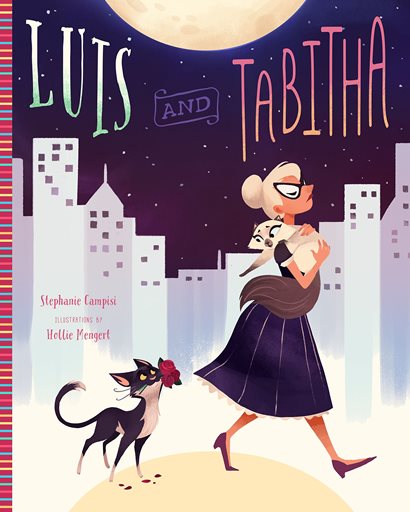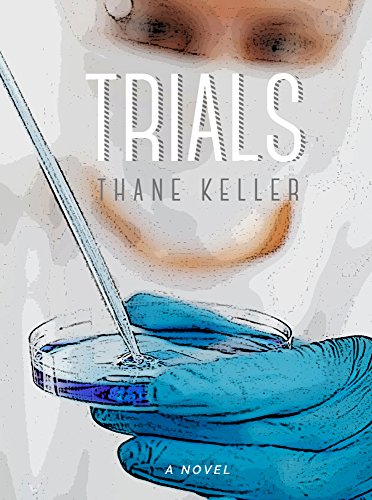I’m pleased to introduce Stephanie Campisi, an Australian-born, Washington-based picture book author who lives in a self-described haunted house in a haunted town – creepy! Stephanie is a copywriter by day; think 9am-5pm (and beyond) writing ads and labels for every day products. Her latest picture book, Luis and Tabitha, is about two star-crossed cat lovers. She has two more picture books coming out in 2019, holds an honors degree in linguistics from the University of Melbourne, and keeps busy in the gym or tending to various animals on her property. You can stay up with Stephanie on her Twitter, Instagram, Facebook, and website.
When you buy through my links, I may earn money from my affiliate partners. Learn more.
1. Stephanie, it’s wonderful having you and we are eager to hear about your journey as an author. You’ve worked with a variety of publishers and now can say something that only seasoned authors can say – that you’ve been represented by two literary agents. This achievement is similar to authors having more books out of print than in print! While it’s unfortunate that Kira Watson has left the business, you are now represented by the wonderfully talented Margaret Sutherland Brown, also at the Emma Sweeney Agency. Receiving an offer of agent representation in the book business is a big, big deal and I can only imagine what it’s like when you switch from one agent to another. Help us understand what that’s been like for you.
Thanks so much for having me, Rhys! And you’re right, “journey” is certainly the right way to describe a career as an author!
The opportunity to work with an agent obviously opens up new avenues for an author, but for me the biggest benefit is to have someone on your side championing both your books and you as an author.
I’ve actually worked with a couple of agents prior to Kira (I’ve been at this a while!) but Kira and I gelled really well in terms of both my writing and a larger vision for my career. We made some pretty good strides together and I’m really proud of what we achieved.
When Kira decided to transition out of agenting, she introduced me to Margaret Sutherland Brown of the same agency. Margaret had read the F&Gs of my forthcoming book, Luis and Tabitha, and was also a fan of my debut, The Ugly Dumpling, and offered to step in. It’s all very new so far, but we’ve had some great introductory conversations and I think we’re very much on the same page about my books and my career.
I know that sometimes things don’t work out this smoothly and really my advice is to eat some chocolate, pull up your socks and get back out there again. If one of you moves on, or the relationship isn’t quite what you want for your career, that’s absolutely fine. If you’re writing publishable material and you’re not an awful person (well, sometimes you can be an awful person if your material is really good 🙂 ) you’ll be just fine. Publishing is full of ups and downs, but it’s nothing personal.
2. You’re a prolific writer, which I loosely define as someone crazy enough not to give up on the craft. You have 3 books out in print (The Ugly Dumpling, The Five Sisters, and Luis and Tabitha) and 1 book coming out soon. What motivates you to write generally and what specifically motivates you to write for children?
That’s the second time I’ve been called prolific of late! I find it very strange as I’m the world’s slowest writer. I think it’s really more the case that if you stick with it for long enough you’ll have something to show for it! Even if most of that something is hidden in the depths of your computer somewhere.
I’m not one of those writers who has an absolutely burning desire to write and is up all night typing away. I’ve dramatically quit writing a few times, in part because I used to feel that real writers did have that write-or-die kind of thing going on. Now, I’m more content with being a bit slower and letting the ideas come as they will. It’s a lot easier to just write when you’re not battling with the lofty idea of being a writer.
In terms of writing for kids, that wasn’t necessarily my intent at the beginning – it’s more a function of how the stories I wanted to write came out. I think my voice, humor and sensibilities lend themselves to the kind of quirky, zany stories that work well with younger readers. For me, picture books and middle grade are the sweet spot, as there’s so much room for playfulness. I think with these age groups there’s room to invite the reader in on your storytelling, and I love that.
I do write for adults as well, but I find it quite hard emotionally to dig about in realism for an extended period. Perhaps when things in the world aren’t quite as dire, I’ll properly commit to a project for older readers!
3. Authors usually tell me they had some pivotal moment in their life when they KNEW they wanted to be a professional writer. Did you have such a moment? If so, tell us about it.
I was a voracious reader as a kid – we had a library at the end of my street and I’d spend every afternoon up there in the beanbags reading through the kids and teen section. I began writing books about grade three and remember writing a fantasy story about giant worms and a Tin Tin/dolphin mash-up. I painstakingly printed it on dot matrix paper and unfolded along all the table tops of my grade four classroom. I was a very cool kid like that.
While I knew that I enjoyed writing, I don’t think I truly realized that real people wrote books. It wasn’t until I sent an author fan mail when I was in my early teens and she wrote back that it clicked. Authors weren’t just imaginary fairies! After that, I began writing in earnest (terrible earnestness). I’ve proceeded in fits and starts since then, with a whole bunch of gaps and mistakes and backtracks. But that’s how writing really goes!
4. Your book, Luis and Tabitha, is a romance about true love conquering all obstacles. Romance in children’s literature is far less prevalent than other genre’s like fantasy or non-fiction. What inspired you to write Luis and Tabitha? What do you hope kids and parents will take to heart from reading the book?
Great question! Luis and Tabitha was inspired by the sad meows of my adopted cat Bunbury, who used to stare out the window of my apartment, no doubt reminiscing on the heady days of his alley cat beginnings. I always wondered what kind of life he might have lived, and what his life might have been like had I not adopted him, and the story arose from there.
I didn’t initially set out to write a love story. I think the question to myself was more about what was the one thing Luis could never have? Tabitha is Luis’ circumstantial opposite and what better way to bring the two worlds together than love?
I’m sure that readers will take all sorts of things from Luis and Tabitha – such is the nature of reading – but I hope that they see acceptance, second chances and not judging a book by its cover (well, other than the cover of Luis and Tabitha, which is as beautiful as the story!). I wanted to write a sweet, kind book totally bereft of any cynicism, and I hope that comes across.
5. Tell us about the early years of your writing career. How did you get on this trajectory of having your name filling bookstore shelves?
It’s been a long, slow slog! I started off writing short stories, selling a few along the way, then when I was about 21 wrote a gaudily dark steampunk novel that almost made it, but not quite. I switched to writing for kids after that – I just decided to write whatever I wanted to write, which made for a nice departure from the angst-filled, self-conscious stuff I’d been writing until then!
It took a long time to get anywhere, though: a solid decade passed before I managed to sell my first book, The Ugly Dumpling. I’d written several novels and a number of picture books during that time, so it wasn’t easy by any means. I do rather despair that maybe novels should be left to more talented writers than me!
6. Our world is growing ever smaller with the improvements in technology. Now, children in another country can come across your books as easily as children down the street. Has this sense of global connections impacted you and what topics you’re passionate about writing?
It’s pretty wonderful, isn’t it? I’m Australian and only recently moved to the US, whereupon I landed in a teeny, tiny town in the middle of nowhere (my office looks out on to a cow paddock). Even growing up in a big city, I had this sense of isolation that I think is probably true for a lot of Australians. There might be millions of people in your immediate vicinity but the country and the oceans around it stretch on almost unfathomably.
Being able to connect with people online has been a bit of a savior, to be honest. Like most writers, I tend towards the hermit, so email, social media and options like Skype classroom chats really shuffle up my social landscape. In terms of buying, promoting and talking about books, it’s a clear shift.
I’m definitely aware of not being American and not having grown up with the US experience; enormous exposure to TV and films aside. That’s had some impact on the topics, themes and settings I choose to write about, although more in my novels than my picture books. I’m not sure that the idea of “global connectedness” has had me writing to a larger audience necessarily, but it’s certainly made it possible to read more widely, which is great. Did I answer your question? Not really, I don’t think!
7. You answered the question just fine! Along the same lines, do you think a writer can be more successful now than ever before in history or would you say the competition is too crowded because of the simplicity technology offers aspiring writers?
Yes and yes, or rather…a bit. I do think a career as an author is more viable than it’s ever been simply because of the expansion of literacy, education and equality. There are more people reading, and more people with the ability to write. There are also increasingly more avenues an author can share their work through, and savvy self-publishers or authors taking alternative funding and distribution routes can do very well for themselves. I do have my reservations about the traditional publishing model and the distribution of wealth throughout that model, but that’s more of a general economic thing than a publishing-only thing.
In terms of the competition being too crowded, I don’t think that’s necessarily true. I think the real issue is how well we’re currently able to connect the right reader with the right book. If you’re searching through a glut of unappealing content and can’t find anything to read, it’s not necessarily a quality issue – it’s more of an access (or information theory) issue! While the technology to easily get books out there is going great, the technology to intelligently connect books and readers is lagging, which is why I think it feels like we’re drowning in books at the moment.
8. Writing can be a lonely endeavor. Do you find yourself enjoying the many hours of seclusion or do you have to surround yourself by lots of people to maintain your sanity? What helps you stay disciplined with your writing goals? Could you give us a sneak peak on some of your current writing goals or deadlines?
I live in a rural area and work from home, so you’re absolutely right that things can get quite isolated. I currently work full-time as a copywriter, which comes with some extremely painful deadlines and often ridiculous working hours. I have to squeeze my writing in around that. It’s difficult to spend the entire day being creative on-demand and then sitting down in the evening to do more of the same, and more often than not any modicum of my wit or writing ability or chocolate has fled by then.
I tend to get most of my writing done on weekends or in short windows here and there as time and self-preservation permit. While I do think that writing regularly makes it much, much easier to write, sometimes it’s simply not possible to sit down and get that hour or those thousand words in. I also think that there’s a point where forcing it is unhealthy – we all have jobs, families and lives, and writing does need to fit at least to some extent around them, rather than demand they all fend for themselves while I chase a cursor across a screen.
I suppose I must have some discipline, though, because I do seem to finish things, and quite a few things at that! I enjoy the puzzle-solving aspect of writing and love finding that perfect turn of phrase, and I think that’s what keeps pulling me back in.
In terms of current projects, I’m finalizing edits on The Five Sisters, and am doing a round of edits on a middle grade novel called The Unfinished Business. I have a few more picture book ideas I’m about to begin work on, and I’m also starting to research and plot out a middle grade novel called The War of the Kites, which has been rattling about in my head for a good ten years now. Now it’s out there – hold me accountable to that!
9. We will do our best to harass you to keep your word about The War of the Kites! Do you have any authors or books in particular that you adore? Any books that dragged you into becoming an author? Anyone in particular that invested in you and your writing career?
Oh gosh, I’ll have to keep this one short or I’ll go on forever. There are authors and books I love across so many genres. Salley Vickers, Sarah Waters, Diana Wynne Jones, Mark Strand, Dodie Smith, Mary Hooper, Cassandra Golds, Norton Juster, John Wyndham, China Mieville, Cressida Cowell…and I adore enormous sweeping Russian novels.
I don’t think there are particular books that drew me into writing, but there are some that have drawn me into particular genres. Beowulf pulled me into poetry, Alfred Bester into science fiction, Jeffrey Ford into fantasy and so on. I’m a bit all over the place with my reading!
In terms of investing in my writing career, a number of my teachers did, and especially my grade 5 teacher Mrs. Dixon and my year 7 teacher Mrs. Giovanini. They went out of their way to make book recommendations and to encourage me to enter my work in competitions. Teachers are so incredibly important in shaping young readers and writers, and I hope they know that their efforts really are appreciated!
At present, my agent(s!) and my fiancé are my biggest cheer squad. My poor partner has quietly endured being read the first drafts of countless picture books about tightrope walking flamingos and pebbles having identity crises. Anyone who thoughtfully and sincerely offers feedback on the logic of a story about a rock star potato is a keeper.
10. What can we expect to see from you in the next 1-2 years? How about 5 years down the road? How best could we stay up to date with your career?
Next year, I have two picture books coming out: The Five Sisters, a Russian folklore-inspired tale, and Very Lulu, a ripped-from-the-headlines story about a K-9 school drop-out. From there, I’m hoping there’ll be a smattering of zany picture books about odd animals, vegetables and minerals. Perhaps one of my dusty novels will emerge blinking in the sunlight by then as well!
Like all authors, I very much hope that you’ll be able to keep up with my career by reading the NYT bestseller list (ha!), but it’s a good deal more likely that any updates will be shared via Twitter or my website. I’m rather boring but quite friendly, so feel free to say hello!
I have no doubt many readers and writers certainly will stop by and say hello! Thank you again, Stephanie, for sharing your journey with us. You’ve got a tremendous career going as a professional writer and the future looks very bright!
If you enjoyed this interview with Stephanie Campisi, be sure to let us know in the comments below! Have any questions for her? Share those too!



